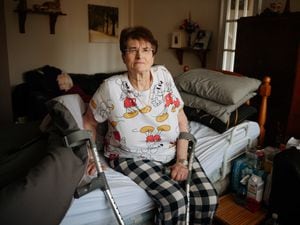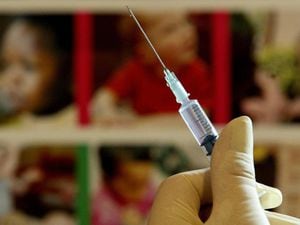Doctor struck off after inappropriate messages to teenage patient
A doctor has been struck off after a tribunal heard he gave a vulnerable teenage patient his personal phone number then sent her inappropriate messages.

Dr Oluwarotimi Olajobi started work at Shawbirch Medical Centre in Telford in August 2019 as part of GP training.
The General Medical Council alleged he hugged 19-year-old “Patient A” and held her hand during a consultation, then sent messages over the following four days – including one inviting her to his home and another asking to see her “naughty side”.
Dr Olajobi, who was 37 at the time, denied his actions were sexually motivated, but a Medical Practitioners Tribunal Service (MPTS) panel found against him, saying the fact that Patient A was a survivor of child sexual exploitation was an aggravating factor.
An MPTS report summarising the case said Dr Olajobi qualified in 2010 at the University of Ibadan, in Nigeria, and came to the UK in 2016.
In December 2019, the GMC’s online complaint system received an allegation of inappropriate patient contact.
Patient A, it said, attended Dr Olajobi’s surgery “in a distressed state” two months earlier.
“It was alleged he gave her his personal mobile number,” the report says.
“After the consultation, it was alleged he used WhatsApp and Facebook Messenger and attempted to call her on a number of occasions over the next few days.”
Dr Olajobi was suspended, and the St Helens and Knowsley Teaching Hospitals NHS Trust – his lead employer – began investigating.
He admitted the facts, but denied sexual intent.
After a week-long hearing, the three-member MPTS panel ruled that providing of the phone number, attempting to contact her by SMS and WhatsApp, and the content of some of the messages – including referring to Patient A as “darling” and “hun”, “pressuring” her to come to his house, asking her if she thought he was “too old” – were sexually motivated.
Georgina Goring, representing the GMC, said Dr Olajobi admitted knowing about Patient A’s vulnerability and mental health issues, and said he “abused his position of trust”.
She accepted he had since engaged with the misconduct process and attended a three-day “Maintaining Professional Boundaries” course as well as several online modules, but said his evidence to the hearing “showed no insight into the sexual nature of the allegation” and called it “an attempt to minimise his behaviour”.
Alecsandra Manning-Rees, Dr Olajobi’s barrister, said her client accepted his conduct was “serious and appalling”.
“She submitted that Dr Olajobi has put the experience of Patient A at the centre of his learning and, while no apology can fix some types of conduct, it does not mean he can’t work as a doctor again,” the MPTS report says.
“Ms Manning-Rees submitted that his reflections do encompass a reflection on sexual motivation as he was plainly aware of how the messages could be viewed.”
She noted that Dr Olajobi had “worked hard over the last 18 months to demonstrate he can be a trusted member of the profession again”, remaining in the UK “to face the allegations head-on”.
The case summary says the panel “had regard to Dr Olajobi’s attempts at remediation and considered his progress to be genuine and focussed”, and had also received numerous positive testimonials. Nonetheless, it ruled his behaviour “fell far below the standard expected from a medical practitioner”.
Aggravating factors included Patients A’s “significant mental health issues, including PTSD” and her young age.
“The GMC accept Dr Olajobi was not aware of her full history. Nonetheless, her background added to her extreme vulnerability.
“In all the circumstances, the tribunal therefore concluded that it was necessary and proportionate to direct that Dr Olajobi’s name be erased from the medical register.”





